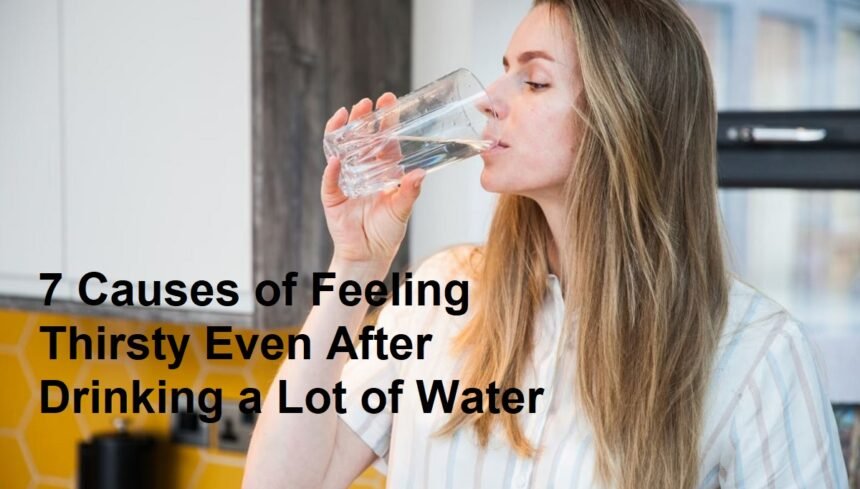Introduction
Many people experience a persistent feeling of thirst even when they have consumed ample amounts of water. This uncomfortable sensation can be confusing and sometimes concerning. While it might seem like you simply need to drink more fluids, persistent thirst can be a sign of underlying health issues that require attention. In this article, we explore seven common causes of feeling thirsty despite drinking enough water.
1. Diabetes Mellitus
One of the most well-known causes of excessive thirst, even after drinking plenty of water, is diabetes. In both type 1 and type 2 diabetes, high blood sugar levels cause the kidneys to work harder to eliminate excess glucose through urine. This increased urination leads to dehydration, prompting the body to signal thirst as a way to replenish lost fluids. Symptoms often include frequent urination, increased hunger, fatigue, and blurred vision. If you notice persistent thirst alongside other symptoms, it’s important to consult a healthcare professional for testing.
2. Dehydration Due to Electrolyte Imbalance
While drinking water is essential, an imbalance of electrolytes such as sodium, potassium, and chloride can cause dehydration and increase thirst. Electrolytes help regulate fluid balance in the body. When their levels are disrupted—due to excessive sweating, vomiting, diarrhea, or certain medical conditions—the body’s ability to retain water becomes compromised, leading to dehydration and a constant sense of thirst.
3. Dry Mouth and Salivary Gland Issues
Sometimes, the sensation of thirst isn’t solely due to overall dehydration but can be linked to dry mouth, or xerostomia. Dry mouth occurs when salivary glands produce insufficient saliva, often due to medications, autoimmune diseases like Sjögren’s syndrome, or dehydration. This sensation of dryness in the mouth can mimic or trigger feelings of thirst. Even if you’ve been drinking water, dry mouth can persist, prompting you to seek more fluids.
4. Kidney Problems
The kidneys play a vital role in maintaining fluid and electrolyte balance. When kidney function is impaired—due to conditions like chronic kidney disease—they may not be able to concentrate urine effectively, resulting in either excessive urination or a sensation of dryness and thirst. Persistent thirst with abnormal urination patterns should prompt a medical evaluation to assess kidney health.
5. Medications and Diuretics
Certain medications, especially diuretics, are designed to increase urine production to treat high blood pressure, heart failure, or edema. While effective, they can also lead to increased fluid loss and dehydration, triggering persistent thirst despite drinking water. Other medications, such as antidepressants or antihistamines, may also cause dry mouth or affect thirst regulation.
6. Hypercalcemia
An elevated level of calcium in the blood, known as hypercalcemia, can cause dehydration and increased thirst. This condition can result from overactive parathyroid glands, certain cancers, or excessive intake of calcium or vitamin D supplements. Symptoms include nausea, constipation, muscle weakness, and mental confusion, along with persistent thirst.
7. Anxiety and Stress
Psychological factors like anxiety and stress can also influence your perception of thirst. Stress can alter hormonal balances, including those involving vasopressin, a hormone responsible for regulating water retention. This disruption can lead to dry mouth and a feeling of dehydration, causing you to drink more water, yet still feel thirsty. Managing stress through relaxation techniques or counseling can sometimes alleviate these sensations.
When to See a Doctor
While occasional thirst is normal, persistent or excessive thirst despite drinking water warrants medical evaluation. If you experience additional symptoms such as frequent urination, weight loss, fatigue, dry mouth, or visual disturbances, consult a healthcare professional. Proper diagnosis is essential to address any underlying health issues effectively.
Conclusion
Feeling thirsty even after consuming large amounts of water can be caused by various medical conditions or factors related to dehydration and electrolyte imbalance. Understanding these causes can help you seek timely medical attention and manage your health better. Remember, staying hydrated is vital, but persistent thirst should never be ignored. Maintaining a healthy lifestyle, monitoring symptoms, and visiting your healthcare provider when necessary are key steps toward ensuring your well-being.












